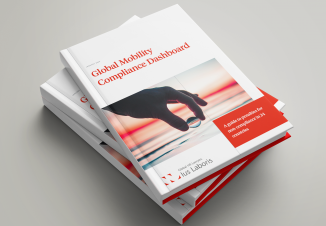
Summary: Argentina | Austria | Belgium | Chile | Colombia | Czech Republic | Estonia | Germany | Greece | Hungary| Italy | New Zealand | Poland | Russia | United Kingdom
Argentina : UN calls on Argentina to repeal decree for expulsion of migrants with criminal records
On 13 September 2019, the Committee on the Protection of the Rights of All Migrant Workers and Members of their Families of the United Nations Organization (‘CMW’) urged the Argentine State to take immediate measures to repeal Decree 70/2017 by which the State expels migrants with a criminal record.
Germán Capoulat, Funes de Rioja
Austria : The prerequisite of ‘sufficient means of subsistence’ for grant of Austrian Citizenship ruled not age discrimination
A general prerequisite for the granting of the Austrian citizenship is, usually, that the applicant has sufficient means of subsistence, unless this is not possible because of reasons for which he or she is not responsible (e.g. disability or illness of the applicant).
In cases in which it is no longer feasible to expect an applicant to find employment because of his or her age, the applicant has to prove that he or she is entitled to a pension or similar payment to cover his or her subsistence needs.
In a recent decision (VfGH 26. 6. 2019, E 89/2019), the Austrian Constitutional Court clarified that this requirement does not constitute discrimination on the grounds of age. This means that a request for proof of sufficient means of subsistence based on the entitlement to pension payments (for older individuals who are no longer in employment and have no realistic expectation of future employment) is not discriminatory.
Birgit Vogt-Majarek, Partner and Stefan Burischek, Associate, Schima Mayer Starlinger Rechtsanwälte GmbH.
Belgium : Changes to European blue card procedure and permits for foreign seasonal workers now in force
From 1 September 2019, the ‘Single Permit’ procedure also applies for the European Blue Card.
Further, the rules concerning work authorisations for non-EEA and Swiss seasonal workers for a maximum of five months per period of 12 months also entered into force from 1 September 2019. In Flanders and Wallonia a work authorisation (a Single Permit if for more than 90 days) for seasonal workers can be obtained on certain conditions in the hotel and catering industry and in agriculture and horticulture. In Brussels, a work authorisation (a Single Permit if for more than 90 days) for foreign seasonal workers can only be obtained in agriculture. Unlike in Wallonia, in Flanders and in Brussels a mandatory labour market test, however, still applies.
Sophie Maes, Partner, Claeys & Engels
Chile: Online applications for extension of Mercosur Temporary Visa and Democratic Responsibility Visa for Venezuelans
From 3 September 2019, all applications for extensions for Mercosur’s Temporary Visa and Democratic Responsibility Visa for Venezuelans must be submitted online though the Department of Foreign Affairs’ website.
An extension can be requested only once, and can be granted for one year.
Marcela Salazar Flores, Partner, Munita & Olavarría
Colombia grants nationality to children of Venezuelan parents born in Colombia.
By Resolution 8470 of 2019, the Civil Registration Office will grant Colombian nationality to children of Venezuelan parents born in Colombia as an exceptional measure to reduce the number of stateless children.
This exceptional measure applies to children born in Colombia from 19 August 2015 and can be requested for the next two years, counted from 20 August 2019.
To be eligible to apply for this benefit, both parents should be Venezuelan. Alternatively, the birth certificate should only include the name of the Venezuelan parent. This benefit is not available if one of the parents is not Venezuelan.
Catalina Santos, Partner, and Diana Monsalve, Associate, Brigard Urrutia.
Colombia: New rules for acquiring Colombian nationality by birth for children of Venezuelan nationals
Law 1997 of 2019, the Congress modified the rules for acquiring Colombian nationality by birth set by Law 43 of 1993. Previously, the children of foreign parents born in Colombia could be registered as Colombians if, at the time of birth, their parents were domiciled in Colombia. Domicile is assessed based on residence accompanied by an intention of permanence.
Under Law 1997 of 2019, the domicile of Venezuelan people with either regular or irregular immigration status, or asylum seekers whose children were born in Colombia between 1 January 2015 and two years after the promulgation of this law will be presumed to be Colombia.
Catalina Santos, Partner, and Diana Monsalve, Associate, Brigard Urrutia.
Czech Republic: Transposition of EU Directive 2016/801 and other legislative changes
A new Act (Act No. 176/2019 Coll, effective as of 31 July 2019, with exceptions), primarily aimed at transposition of Directive (EU) 2016/801, introduces a visa-free regime for researchers and students, with special residence permits allowing them to temporarily stay in the Czech Republic for the purposes of job searching or entrepreneurship. It also allows free access to the labour market for family members of researchers (under certain conditions).
The Act also introduces extraordinary work visas (issued in cases of labour shortages), the possibility of setting quotas on permits issued annually, an obligation for certain foreign nationals to complete integration courses, and an obligation for foreign employers to notify any postings of their workers to the Czech Republic.
Ondřej Chlada, Randl Partners
Estonia: Refusing to issue a residence permit to the registered same-sex partner of an Estonian citizen is unconstitutional
The Supreme Court of Estonia declared on 21 June 2019 (resolution No. 5-18-5) that the part of the Aliens Act that precludes granting temporary residence permits to same-sex registered partners of Estonian citizens to live their family life in Estonia is invalid and unconstitutional.
The Supreme Court stated that the current Aliens Act treats foreigners differently by allowing residence permits for same sex spouses of Estonian citizens but precluding the grant of a residence permit to a registered partner.
Since the foreign national cannot settle in Estonia without a residence permit the part of the Aliens Act which does not allow the grant of a permit to registered partners disproportionately infringes the fundamental family rights of both the applicant for a residence permit and his or her Estonian partner. Although a registered same sex partner of an Estonian citizen can apply for a residence permit on another basis (for example to work), this does not give the person sufficient assurance that he or she will be able to live family life in Estonia.
The Supreme Court found that based on the principles of human dignity and equal treatment guaranteed by the Estonian Constitution, the fundamental right to a family life extends to the right of same-sex partners to live in Estonia as a family.
Karina Paatsi, Partner, COBALT Law firm
Germany: Employment Ministry publishes key points on implementation of Posted Workers Reform Directive
The German Ministry of Employment and Social Affairs has published key points on the intended implementation of the Posted Workers Reform Directive (EU) 2018/957 entitled ‘Equal pay for equal work for everyone in Europe: Preventing wage dumping. Ensuring order on the labour market. Shaping mobility fairly’.
According to these key points, the Ministry intends to introduce a draft statute that will amend the German Posting of Workers Act (which currently implements the ‘old’ Posted Workers Directive 96/71/EC) in line with the EU Reform Directive.
Although the Ministry expressly intended to publish a draft statute in line with these key points ‘in summer 2019’, this draft has not yet been published. However, since the Reform Directive must be implemented into member states’ national law by 30 July 2020, the draft statute, which must still pass the legislative procedure, is expected to be published soon.
Julia Uznanski, Associate, KLIEMT.HR Lawyers
Greece: Social security number for EU citizens
The General Directorate of Social Security of the Ministry of Labour and Social Solidarity has provided further guidance on the assignment of a social security number (ΑΜΚΑ) to EU citizens who enter Greece for work, as employees or self-employed, and who have not completed a three-month stay in our country (in document No. 80320 / no.33830 / D18.2227 / 29-07-2019).
Katerina Papastergiou, Associate, Kremalis Law firm
Greece: General regulation on the operation of Reception and Identification Centres for migrants
A Joint Ministerial Decision, entitled ‘General Regulation on the Operation of Reception and Identification Centres’ (1/7433 ΦΕΚ Β΄ 2219/10.06.2019) has been adopted.
The purpose of this General Regulation is to regulate the internal structure and operation of Reception and Identification Centres and Mobile Reception and Identification Units. In particular, the procedures for receiving third-country nationals and stateless persons and identifying their rights and obligations are detailed, as well as the general rules for temporary residence in Reception and Identification Centres.
Katerina Papastergiou, Associate, Kremalis Law firm
Greece: Changes to documentation and conditions for intra-corporate transfers
A new law aimed at harmonising Greek law with EU Directive 2014/66 has come into force (L. 4540/2018, as amended by A.62 L. 4609/2019 with effect from 3 May 2019), supplemented by the provisions of law L. 4251/2014.
The purpose of the Directive is to make it easier for companies to post employees within Europe and to reduce bureaucracy in several member states. The new Greek law covers third-country nationals (non-EU) who apply to enter a member state under an intra-corporate transfer as managers, specialists or trainees. The law sets out what documents are required for short-term and long-term placements, the grounds for rejection and withdrawal of the application, how long an intra-corporate transfer can last and how long the permit will be valid for.
Evaggelia Patsialou, Kremalis Law FirmFani Batsila, Kremalis Law Firm
Hungary: Immigration and Refuge Office becomes the National Directorate of Immigration.
The name of the Immigration and Refuge Office has been changed to the National Directorate of Immigration from 1 July 2019 and as a law enforcement body it continues to operate as part of the police (126/2019 (V.30.) Government Decree).
Henrietta Hanyu, CLV Partners Law Firm
The Hungarian Government has extended the immigration ‘crisis’ status for another six months.
The Hungarian Government has extended the so-called ‘crisis situation caused by immigration’ for another six months. This status was originally announced in March 2016 for a period of six months.
Following this amendment (contained in Government Decree 217/2019 (IX.5.)), the crisis situation caused by the immigration has now existed in Hungary for three and a half years.
In a so-called ‘crisis situation’, extraordinary administrative arrangements can be applied with regard to the migrants specified in Law No LXXX of 2007 on the right to asylum.
Henrietta Hanyu, CLV Partners Law Firm
Italy: New Employment Office guidelines relating to transnational secondments
In August 2019, the Employment Office published practical guidelines following its previous instructions released with the circular No. 1/2017.
The new instructions provide confirmation on many practical issues regarding how to manage a transnational secondment, including, inter alia, the main features of the contact person acting as the representative of the service provider.
This could be one of the seconded employees, an assistant of the employer or even a third party (such as a payroll provider). The contact person’s duty is to support the service provider in taking the correct administrative steps without in any way taking on any joint liability. The guidelines also provide indications on terms and conditions of employment (e.g. compensation) and criteria to identify a non-genuine secondment.
Avv. Valeria Morosini, Toffoletto De Luca Tamajo e Soci
New Zealand: Changes to employer-assisted temporary work visas
On 17 September 2019, Immigration New Zealand announced a series of changes to the temporary entry work visa framework following a public consultation on the proposed changes.
On 7 October 2019, a number of changes to the Talent (Accredited Employer) Work Visa category will come into effect. These include:
Over the next 18 months, further changes will be introduced in various stages, including (but not limited to) the replacement of six current employer-assisted temporary visa categories with one new visa called Temporary Work Visa and the introduction of a new employer-led visa application process.
Simon Lapthorne, Executive Partner, Meilun Chen, Solicitor, Kiely Thompson Caisley
Poland: Polish public administration not ready to handle growing number of foreign migrants
Results of the recent audit of the immigration offices in Poland run by the Polish Audit Office (NIK) show that the Polish public administration is unable to handle the rapidly growing number of foreign nationals migrating to Poland. Average processing times have increased more than threefold over the last four years, to 206 days. In extreme cases, some foreign nationals waited for more than three years for a residence permit decision. The government is now reviewing the audit report to propose actions aiming at improving immigration processes.
Karolina Schiffter, Partner, Kinga Polewka, Lawyer, Raczkowski Paruch
Russia: New forms of migration reports and applications
Starting from 9 September 2019, companies must use new forms of the migration reports and applications for their submissions to the migration authorities for hiring foreign nationals.
The new forms were approved by an Order of the Ministry of Internal Affairs of the Russian Federation.
The following obligatory reporting forms are being changed, namely:
All reports submitted after 9 September 2019, should be prepared using the new forms. Failure to use the correct form of notification may entail an administrative fine of up to RUB 1,000,000 or the administrative suspension of a company’s activity for up to 90 days.
A new form is also being introduced for the application that must be made on the engagement of a highly qualified foreign specialist.
Notifications and applications submitted before 9 September 2019 using the old forms will be valid and re-submission using the new forms is not required.
Irina Anyukhina, Partner, Margarita Egiazarova, Associate, ALRUD Law Firm
United Kingdom: UK Government publishes no-deal Brexit immigration policy
On 4 September 2019, the UK Government announced that in the event of a no-deal Brexit, freedom of movement will continue until 31 December 2020. However, after Brexit, EEA and Swiss nationals, along with their spouse or partner and children under 18 can voluntarily apply for European Temporary Leave to Remain (‘Euro TLR’), which will be a free, online application and subject to criminality checks. The status will be valid for 36 months from the date of grant and does not restrict allowed activities.
The advantage of holding Euro TLR is that time spent with this status can be counted towards settlement in a category that leads to settlement under the immigration system that is due to be implemented from 1 January 2021.
Those who do not apply for Euro TLR or under another immigration category must leave the UK by 31 December 2020.
Andrew Osborne, partner at Lewis Silkin LLP


